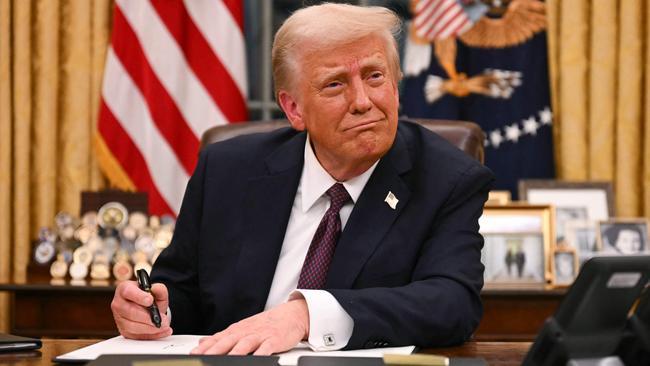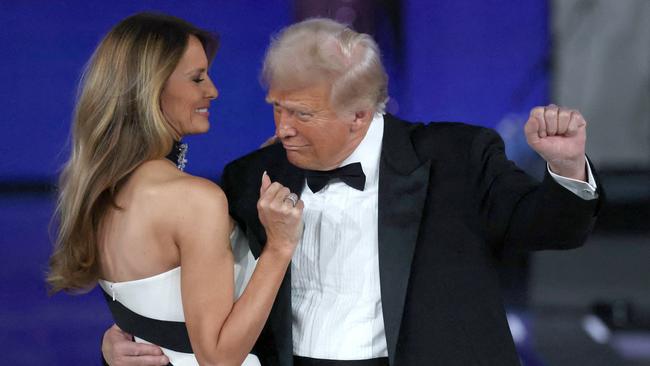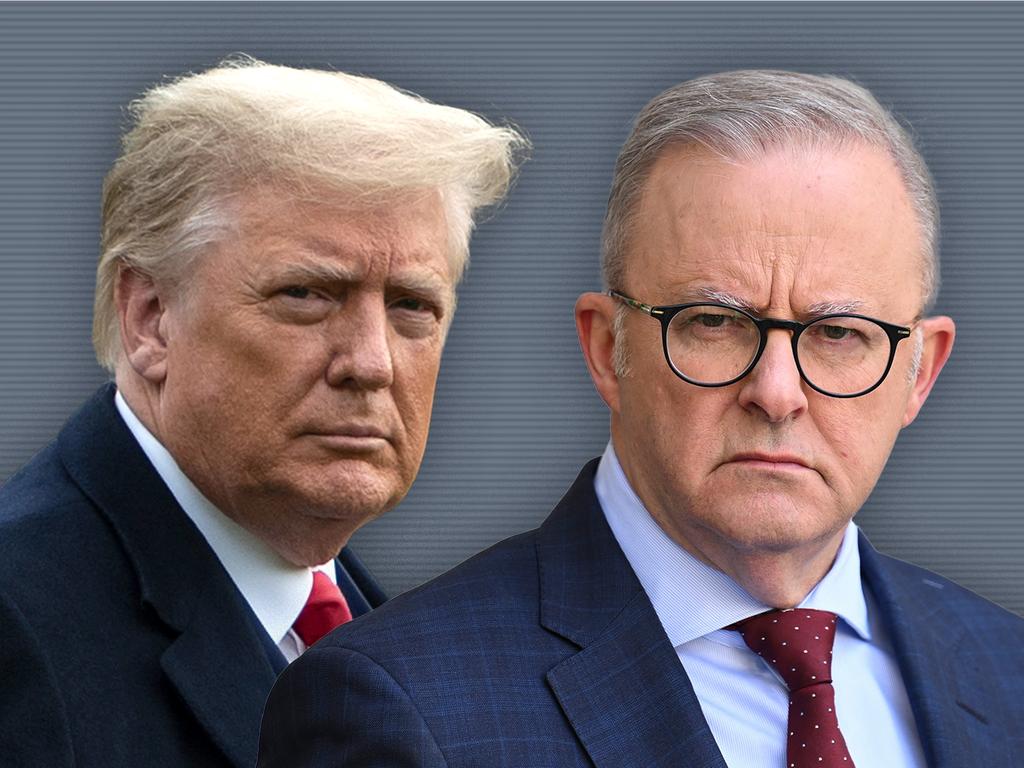Donald Trump pledges golden age, condemns Biden-era weakness, betrayal
Donald Trump pardoned 1500 participants in the January 6 Capitol attack, withdrew from the Paris climate accord and rescinded nearly 80 Biden-era executive measures just hours after taking the oath of office.

Donald Trump began ushering in his promised “American golden age” hours after taking the oath of office by pardoning 1500 participants in the January 6 Capitol attack, withdrawing from the Paris climate accord, empowering the military to defend the US border and rescinding nearly 80 Biden-era executive measures.
The US President started reshaping the American government and signing the spate of executive orders in a display of showmanship at a desk in front of 20,000 supporters at the Capital One Arena in Washington, and went on to approve dozens more in the evening in the White House Oval Office, where he engaged in friendly banter with journalists and discovered the letter left for him by Joe Biden.

Mr Trump declared two immediate national crises – an energy emergency requiring the fast-tracking of project approvals to shore up reliable, affordable supply, and an emergency at the southern border requiring the designation of crime cartels as terrorist organisations and use of the US armed forces.
He revealed the imposition of 25 per cent tariffs on Canada and Mexico – two of America’s top trading partners – was being considered for a February 1 start rather than the first day of his presidency, and hedged on whether a universal tariff remained a possibility, declaring “we’re not ready for that just yet”.
While US markets were closed for Martin Luther King Jr Day, the US dollar fell by more than 1 per cent on news of the planned tariff moves, but the Australian dollar hit a three-week high and the ASX 200 rose as much as 1.3 per cent. In addition to the introduction of new tariffs, Mr Trump commissioned a review of existing trade agreements – with the US Trade Representative to “recommend any revisions that may be necessary or appropriate”.
Delivering his inaugural address earlier inside the Capitol Rotunda, where Australian Foreign Minister Penny Wong was watching, Mr Trump promised to restore “common sense” to government.
“We will not be conquered. We will not be intimidated. We will not be broken. And we will not fail,” he said. “We will stand bravely. We will live proudly. We will dream boldly. And nothing will stand in our way.”
The address was delivered in front of a distinguished crowd of Supreme Court justices, former presidents, vice-presidents, members of congress and Mr Trump’s incoming cabinet, along with tech moguls Jeff Bezos, Mark Zuckerberg, Tim Cook and Elon Musk, who has been chosen to lead the Department of Government Efficiency.
Mr Trump accused the Biden administration of a “horrible betrayal” of the country – one he would reverse – in which the rights of illegal migrants had been prioritised over the interests of US citizens, and vast sums spent on foreign conflicts instead of securing America’s southern border.
“For many years, a radical and corrupt establishment has extracted power and wealth from our citizens while the pillars of our society lay broken,” he said. “We will immediately restore the integrity, competency and loyalty of America’s government.
“Just a few months ago, in a beautiful Pennsylvania field, an assassin’s bullet ripped through my ear.
“But I felt then and believe even more so now that my life was saved for a reason – I was saved by God to make America great again.”
Mr Trump promised to “end the Green New Deal” and “revoke the electric vehicle mandate”, while reviving the auto-manufacturing sector, as well as unveiling an ambitious plan to extend America’s manifest destiny into space by having an astronaut plant the Stars and Stripes on the surface of Mars.
There is a halt on the issuing of permits for new wind projects while a review is conducted, and Mr Trump also announced that US military members expelled for objecting to the Covid-19 vaccine would be reinstated with full back-pay.
The initial executive orders signed by Mr Trump included pausing the issuing of new regulations, freezing the hiring of civilian employees in the executive branch, stamping out weaponisation of government, returning federal bureaucrats to working at the office, withdrawing America from the World Health Organisation, rescuing TikTok, upholding free speech in the public square, and implementing inflation-busting measures across all executive agencies. Promoting a “colourblind and merit-based” American society, Mr Trump signed further orders making it the official policy of the US government to “recognise two sexes, male and female”.
“We are going to bring law and order back to our cities,” Mr Trump said. “This week I will also end the government policy of trying to socially engineer race and gender into every aspect of public and private life.”
On tariffs, Mr Trump said he would move immediately to overhaul the trade system to “protect American workers”.
“Instead of taxing our citizens to enrich other countries, we will tariff and tax foreign countries to enrich our citizens,” he said. “For this purpose we are establishing the External Revenue Service to collect all tariffs, duties and revenues.”
The pardon for those charged over their involvement in the January 6, 2021 march on the Capitol Building generated the most controversy on Monday. Leading Democrat Nancy Pelosi took aim at the pardons as “shameful” and an “outrageous insult to our justice system”.
Another executive order signed by Mr Trump revoked the security clearance of 51 former intelligence officials who signed a 2020 letter stating the emails from Hunter Biden’s laptop had the “classic earmarks of a Russian information operation”.
Former CIA heads John Brennan and Michael Morell, as well as Mr Trump’s former national security adviser, John Bolton, were captured by the order, which also requires a report on “any disciplinary action” that should be taken.

Mr Trump signed a key directive for new Secretary of State Marco Rubio, who was unanimously confirmed on Monday local time by the US Senate, requiring US foreign policy to “champion core American interests and always put America and America citizens first”.
In his inaugural address, Mr Trump said his “proudest legacy will be that of a peacemaker and a unifier” with his special envoy to the Middle East, Steve Witkoff, later sending a vital message to US allies that “the days of blank cheques are over”.
Addressing the post-inauguration rally at the Capital One Arena, Mr Witkoff declared that the US expected “reciprocal actions from our partners”, and made clear that “we are done carrying the financial burdens for nations that are unwilling to fund their own progress”.
Mr Trump doubled down on his plan to change the name of the Gulf of Mexico to the Gulf of America and reaffirm his aim to regain control of the Panama Canal: “We gave it to Panama. And we’re taking it back.”
Mr Trump also talked up the prospects of an agreement to end the conflict in Eastern Europe and said Ukrainian President Volodymyr Zelensky “wants to make a deal. I don’t know if Putin does”.






To join the conversation, please log in. Don't have an account? Register
Join the conversation, you are commenting as Logout